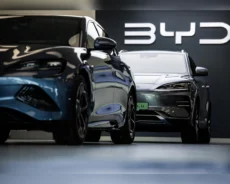In a significant move, Warren Buffett’s Berkshire Hathaway has completely divested its stake in Chinese electric vehicle (EV) giant BYD, marking the end of a 17-year investment that began in 2008 and yielded billions in returns for the American conglomerate. The exit, long anticipated by market observers, was confirmed through a filing with the U.S. Securities and Exchange Commission (SEC) in May 2025, which showed Berkshire Hathaway Energy, the unit holding the BYD shares, valuing its stock at zero as of March 2025. The development was first reported by CNBC on Sunday.
A Profitable Journey
Berkshire Hathaway’s investment in BYD began in 2008 when it acquired 225 million shares, equivalent to a 10% stake, for approximately $230 million at around HK$8 per share. This strategic bet on the then-emerging EV maker proved highly lucrative. Over the years, BYD’s stock soared, driven by its rapid growth in the global EV market. By the time Berkshire began trimming its stake in August 2022, selling 1.33 million shares at an average price of HK$277 ($35.7) each, the investment had already generated substantial returns.
Under Hong Kong stock exchange rules, shareholders are required to disclose ownership only when their stake exceeds 5%. As Berkshire continued to sell down its position, its holdings fell below this threshold, making its moves less visible to the public. The gradual reduction culminated in the complete exit disclosed in the recent SEC filing.
Li Yunfei, BYD’s public relations head, acknowledged Berkshire’s contribution over the past 17 years in a post on his verified Weibo account, expressing gratitude for the investment and support. When approached for further comment, a BYD representative referred to Li’s statement and declined to provide additional details.
BYD’s Rise to Prominence
Despite Berkshire’s exit, BYD has solidified its position as a global EV powerhouse. In 2024, the company surpassed Tesla, led by billionaire Elon Musk, to become the world’s top EV seller by volume, driven by its diverse product portfolio and competitive pricing. Today, BYD boasts a market capitalization exceeding HK$975 billion in Hong Kong and 975 billion yuan ($137 billion) in Shenzhen. The company’s success has also propelled its chairman and CEO, Wang Chuanfu, to become China’s 11th richest person, with a net worth of $24.4 billion, according to the Real-Time Billionaires List.
BYD’s growth has been fueled by its ability to offer a wide range of vehicles, often at affordable prices, appealing to cost-conscious consumers. However, the company now faces significant challenges as it navigates a fiercely competitive EV market and macroeconomic headwinds in China.
Challenges Ahead for BYD
Analysts widely expect BYD to miss its ambitious 2025 sales target of 5.5 million EVs globally. Intense competition and Beijing’s concerns about the EV sector’s aggressive discounting strategies, which authorities believe contribute to deflationary pressures in China’s economy, are key hurdles. Automakers, including BYD, have engaged in a “race to the bottom” to attract increasingly frugal consumers, putting pressure on margins.
In a September 2025 research note, Deutsche Bank forecasted that BYD would deliver 4.7 million vehicles globally in 2025, a 10% increase from the 4.27 million units sold in 2024. Similarly, Morningstar analyst Vincent Sun projected sales of 4.8 million vehicles for the year. While these figures reflect growth, they fall short of BYD’s internal targets, highlighting the challenges posed by market dynamics and regulatory scrutiny.
Implications of Berkshire’s Exit
Berkshire Hathaway’s decision to fully exit its BYD investment reflects Warren Buffett’s disciplined approach to portfolio management, often characterized by long-term holdings followed by strategic exits when valuations or market conditions shift. The move does not necessarily signal a lack of confidence in BYD’s future but may reflect Berkshire’s reassessment of risk and opportunity in the rapidly evolving EV sector.
For BYD, the end of Berkshire’s involvement closes a chapter of high-profile Western backing, but the company’s strong market position and global ambitions suggest it remains well-positioned for growth, albeit with challenges. As the EV industry continues to evolve, BYD’s ability to innovate and adapt in a competitive landscape will be critical to sustaining its leadership.















